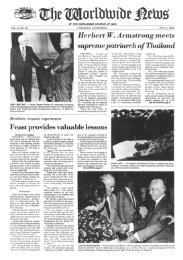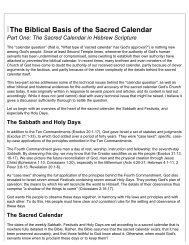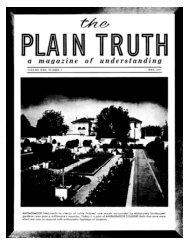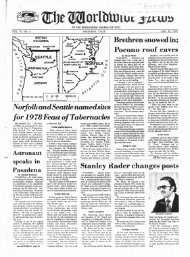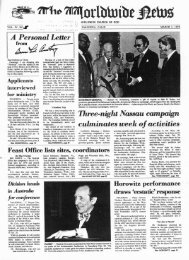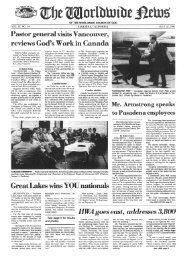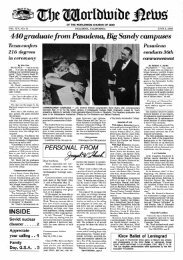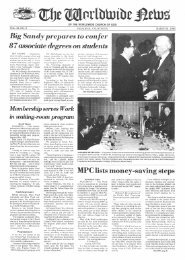PT Sep-78 - Herbert W. Armstrong Library and Archives
PT Sep-78 - Herbert W. Armstrong Library and Archives
PT Sep-78 - Herbert W. Armstrong Library and Archives
You also want an ePaper? Increase the reach of your titles
YUMPU automatically turns print PDFs into web optimized ePapers that Google loves.
Leonard's Eleven Reasons<br />
for the Spread of Christianity<br />
1) The advance of the United States<br />
across the North American continent;<br />
the extension of British political<br />
dominion around the world,<br />
enforcing peace where there had<br />
been nothing but anarchy-the pax<br />
Britannica; the partition of Africa<br />
by Europe.<br />
2) The harnessing of steam power to<br />
t!"avel by ship <strong>and</strong> rail; the Suez<br />
Canal. (Followed in but a few<br />
decades by the Panama Canal, the<br />
automobile, diesel power <strong>and</strong> the<br />
airplane.)<br />
3) The telegraph <strong>and</strong> the post office.<br />
(And, in due course, the telephone,<br />
followed rapidly, once the twentieth<br />
century began, by radio <strong>and</strong> TV.)<br />
4) World exploration.<br />
5) The forcible opening of China by<br />
the Opium War, 1842, <strong>and</strong> of Japan<br />
by Admiral Perry <strong>and</strong> the American<br />
fleet in 1853.<br />
6) Changes in the charter in 1813,<br />
1833 <strong>and</strong> 1857, forcing the British<br />
East India Company to allow missionaries<br />
into their domain, whom<br />
they at first regarded as more dangerous<br />
to their possessions <strong>and</strong> rule<br />
than anything else.<br />
7) Independence in La tin America;<br />
the spread of the idea of religious<br />
freedom even in Iran <strong>and</strong> the Turkish<br />
intelligent, each one trained to think<br />
<strong>and</strong> act for himself, with democracy<br />
in the State reacting upon the<br />
Church, a people loving liberty better<br />
than life" (p. 47).<br />
An Open Door<br />
In America, too, as the eighteenth<br />
century neared its end, zeal, faith<br />
<strong>and</strong> doctrinal underst<strong>and</strong>ing were<br />
low. In Leonard's words, "the only<br />
zeal left was for an orthodoxy which<br />
was stone dead" (p. 49).<br />
But then a revolution occurred.<br />
"The closing years of the eighteenth<br />
century constitute in the history of<br />
Protestant missions an epoch indeed,<br />
since they witnessed nothing<br />
Empire (which was in the 1800s dominant<br />
over most of the Middle East).<br />
Under this head come all the freedoms<br />
of poli tical democracy.<br />
8) Multiplication of Bibles <strong>and</strong><br />
Christian literature. ("It was not until<br />
within a few decades [of Leonard's<br />
original writing in the 1890s]<br />
that the art of printing emerged<br />
from infancy" [A Hundred Years of<br />
Missions, p. 136].) It had taken 1500<br />
years to get the Bible into 23 languages,<br />
<strong>and</strong> that in manuscripts<br />
only. The complete Bible was published<br />
in Chinese in 1811 <strong>and</strong> the<br />
trend continued. (The Russians,<br />
nominally Christian for centuries,<br />
got their first complete translation<br />
only in 1876, but today the Bible is<br />
available at least in part in all but a<br />
h<strong>and</strong>ful of the world's 3000-odd<br />
languages <strong>and</strong> dialects.)<br />
9) The emancipation of women, permitting<br />
them a chance to help in<br />
missionary work, either as wives or<br />
as unmarried helpers <strong>and</strong> teachers.<br />
10) Increasing availability of converted<br />
native personnel.<br />
11) The quickening interest in spiritual<br />
things in the homel<strong>and</strong>s. No<br />
small part of this is the awakening<br />
of care for others-in effect, "brotherly<br />
love."<br />
less than a revolution, a renaissance,<br />
an effectual <strong>and</strong> manifold ending of<br />
the old, a substantial inauguration<br />
of the new . . .. Beginning in Great<br />
Britain, it soon spread to the Continent<br />
<strong>and</strong> across the Atlantic. It was<br />
no mere push of fervor, but a<br />
mighty tide set in, which from that<br />
day to this has been steadily rising<br />
<strong>and</strong> spreading" (p. 69).<br />
It was the age of William Carey,<br />
looked back on as the beginning of<br />
modern missions <strong>and</strong> methods in<br />
backward l<strong>and</strong>s, though even his<br />
work in very few years came to<br />
naught. Indeed, Leonard shows the<br />
failure of just about every effort begun<br />
before the end of the century.<br />
"Yet his [Carey's] work does represent<br />
a turning point; it marks the<br />
entry of the English-speaking world<br />
on a large scale into the missionary<br />
enterprise-<strong>and</strong> it has been the<br />
English-speaking world which has<br />
provided four-fifths of the non-Roman<br />
missionaries from the days of<br />
Carey to the present time" (p. 2.61).<br />
The Zenith of Britain<br />
<strong>and</strong> America<br />
When the United States <strong>and</strong> Canada<br />
experienced the so-called Great<br />
Awakening from about 1790 to<br />
1830, a surge of evangelistic fervor<br />
to reach <strong>and</strong> convert the masses was<br />
channeled into an effort to Christianize<br />
the frontier. Meanwhile began<br />
the formation of British,<br />
American <strong>and</strong> European missionary<br />
<strong>and</strong>/or Bible societies. From a slow<br />
start in 1804, new societies proliferated<br />
after the 1820s at the astounding<br />
rate of nearly three per<br />
year for the rest of the century. Neill<br />
mentions the important societies<br />
formed to 1842. "And then the list<br />
becomes so long .. . it is no longer<br />
possible to follow it. By the end of<br />
the century every nominally Christian<br />
country <strong>and</strong> almost every denomination<br />
had begun to take its<br />
share in the support of the missionary<br />
cause" (Neill, p. 252).<br />
This time-finally-efforts in heathen<br />
l<strong>and</strong>s began to be markedly<br />
successful. If, until the nineteenth<br />
century, all missionary activity had<br />
been pushed under the door or<br />
thrown through the transom, at last<br />
the door to the world was open.<br />
Leonard points out II major factors<br />
in the worldwide spread of<br />
nineteenth-century missions <strong>and</strong><br />
Christianity (see box), having principally<br />
to do with modern technological<br />
achievements <strong>and</strong> the<br />
predominant part played by the<br />
English-speaking peoples in giving<br />
their benefits to the rest of the<br />
world.<br />
To Leonard's categories should be<br />
added at least two more points: first,<br />
a vast increase since about the 1830s<br />
in the materials available for biblical<br />
studies through libraries, private<br />
collections <strong>and</strong> monasteries, <strong>and</strong><br />
through archaeological discovery;<br />
second, <strong>and</strong> perhaps most important<br />
14<br />
The PLAIN TRUTH <strong>Sep</strong>tember 19<strong>78</strong>



